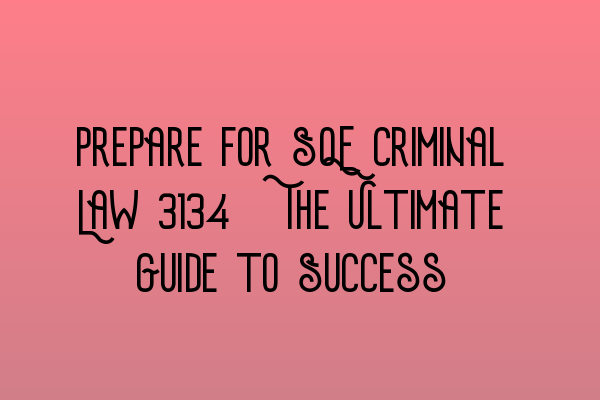Prepare for SQE Criminal Law 2023: The Ultimate Guide to Success
Are you aspiring to become a criminal law practitioner in the UK? The Solicitors Qualifying Examination (SQE) is your gateway to making that dream a reality. As the new assessment system for individuals seeking admission as solicitors, the SQE will replace the current Qualified Lawyers Transfer Scheme (QLTS) and the Legal Practice Course (LPC) in 2023.
To ensure you are fully prepared for the SQE Criminal Law assessment, we have created the ultimate guide to help you navigate through the process and achieve success. From understanding the exam structure to mastering key topics and enhancing your exam technique, this guide covers it all.
1. Familiarize Yourself with the SQE Criminal Law Assessment
Before diving into your preparation, it is essential to familiarize yourself with the structure and format of the SQE Criminal Law assessment. The exam consists of both multiple-choice questions (MCQs) and written tasks that will evaluate your knowledge and application of criminal law principles.
Understanding the exam structure will allow you to tailor your study plan accordingly and allocate the necessary time and resources to each section.
2. Master the Key Topics Tested in SQE Criminal Law
One of the most crucial aspects of your preparation is mastering the key topics that are likely to be tested in the SQE Criminal Law assessment. Some of the core areas to focus on include:
- Homicide
- Theft and related offenses
- Sexual offenses
- Drugs offenses
- Public order offenses
Make use of reputable study materials and resources to gain a comprehensive understanding of these topics. Additionally, practice applying your knowledge to hypothetical scenarios, as this will help develop your analytical and problem-solving skills.
3. Enhance Your Exam Technique
Success in the SQE Criminal Law assessment not only depends on your knowledge of the subject matter but also on your exam technique. Here are a few tips to enhance your exam technique:
- Time Management: Practice working within time constraints to improve your speed and accuracy.
- Reading and Comprehension: Develop strategies to quickly and effectively read and understand exam questions.
- Effective Writing Skills: Work on improving your legal writing skills, including clarity, coherence, and organization.
4. Utilize Quality Study Materials
Investing in high-quality study materials is essential for your SQE Criminal Law preparation. Look for trusted resources such as textbooks, casebooks, and online courses specifically designed for SQE exam candidates.
Additionally, make use of practice exams and sample questions to familiarize yourself with the types of questions that may be asked in the assessment.
5. Join Study Groups and Seek Professional Guidance
Studying with others can be highly beneficial as it allows you to discuss and debate complex legal concepts. Joining study groups or forming study partnerships can provide valuable insights and help solidify your understanding of the subject matter.
For personalized guidance and feedback, consider enrolling in an SQE Criminal Law preparation course. These courses are designed to provide comprehensive guidance and support, helping you to identify and address any knowledge gaps or weaknesses.
Conclusion
Preparing for the SQE Criminal Law assessment requires dedication, organization, and a strategic approach. By familiarizing yourself with the exam structure, mastering key topics, enhancing your exam technique, utilizing quality study materials, and seeking professional guidance, you will be well on your way to achieving success in the SQE Criminal Law 2023 assessment.
For more legal insights and resources, be sure to check out our related articles:
- Exploring the Impact of Frustration on Contractual Obligations: Legal Insights
- Elevate Your Knowledge with Contract Law Tutorials
- Interpreting Contractual Clauses: Unlocking the Hidden Meanings
- Legal Aspects of Business Contracts: Key Considerations for Entrepreneurs
- SQE Contract Law vs. Traditional Qualifications: A Comparative Analysis
